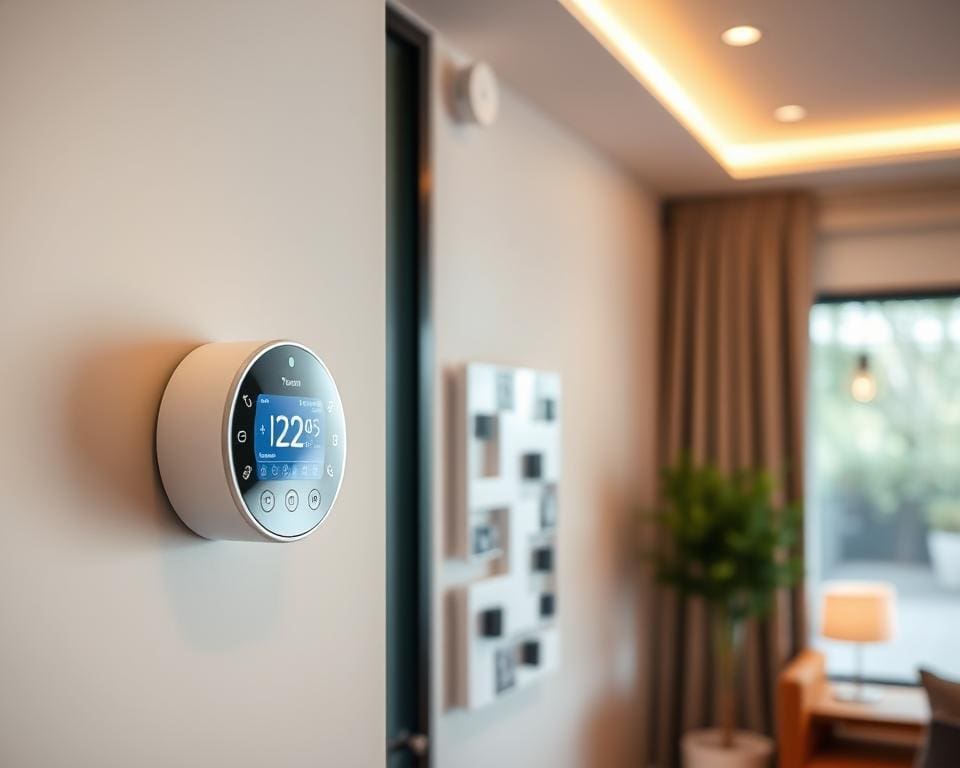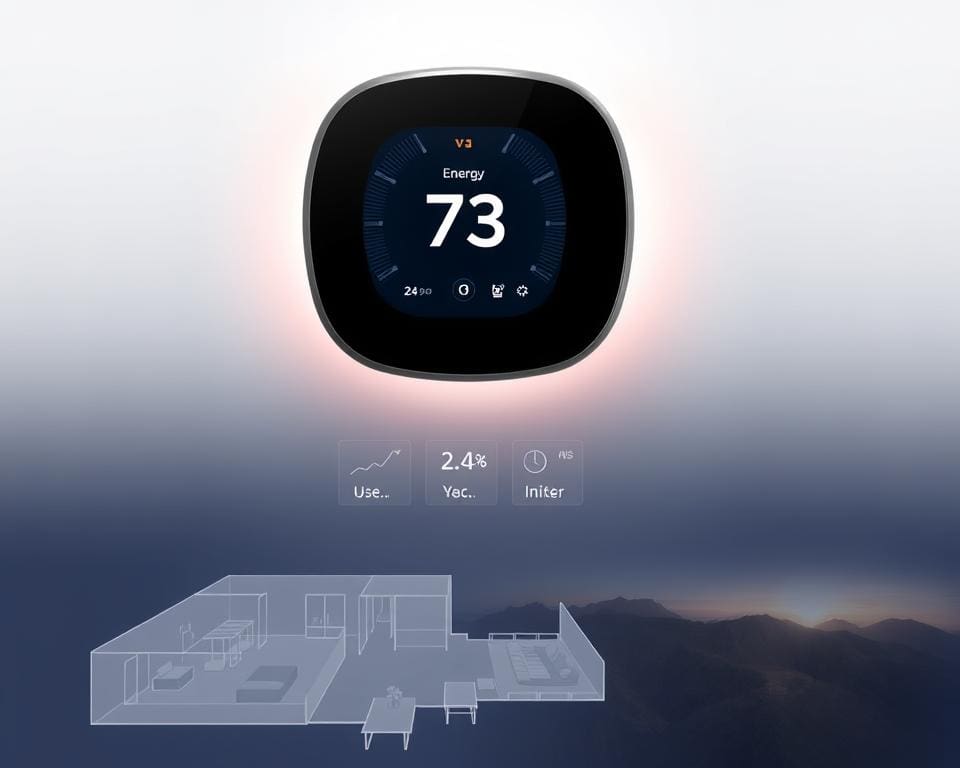In an era where energy-efficient technology is paramount, smart thermostats have emerged as vital tools for cost savings in home heating. These intelligent devices not only allow for precise temperature control but also optimise heating schedules, significantly reducing energy consumption. According to the Energy Saving Trust, homeowners can save up to £150 annually by installing smart thermostats. Further evidence from Which? suggests that these devices can cut heating energy usage by 10-12%. Nest’s research even indicates potential savings of an additional 20% through automated adjustments based on user habits. Embracing smart thermostats brings not only financial benefits but also contributes to a sustainable future.
Understanding Smart Thermostats and Their Benefits
A smart thermostat represents an innovative approach to managing home heating. With a smart thermostat definition as a device that utilises wifi connectivity and automation, these systems create a new layer of convenience and efficiency in residential heating. By continually learning and adapting, they provide tailored solutions to optimise the heating experience.
What is a Smart Thermostat?
A smart thermostat allows homeowners to control their heating systems remotely, offering flexible management through smartphones or tablets. This technology ensures an effortless user experience, aligning with contemporary lifestyles while maximising comfort and convenience.
Key Features of Intelligent Thermostats
Intelligent thermostat features greatly enhance the effectiveness of home heating systems. Some notable characteristics include:
- Remote access via mobile applications, allowing control from anywhere.
- Learning algorithms that adapt to user habits for improved energy management.
- Geofencing technology, automatically adjusting temperatures based on user location.
How Smart Heating Benefits Your Home
Utilising smart heating solutions simplifies energy tracking and enhances overall home comfort. Home heating benefits include:
- Increased energy efficiency, leading to reduced utility bills.
- Customisable schedules for tailored heating needs throughout the week.
- Improved environmental impact thanks to better energy management.

Energy-Efficient Heating Solutions for Modern Homes
As we strive for greater sustainability in our living spaces, energy-efficient heating solutions have become imperative. Smart heating systems, such as smart thermostats, not only enhance comfort but vastly improve our ability to manage energy consumption. Understanding the mechanics of how these innovations optimise energy use reveals their potential for transforming typical heating methods.
How Smart Thermostats Optimize Energy Usage
Smart thermostats leverage advanced technology to analyse heating patterns and adjust settings automatically. These devices utilise real-time data, enabling them to respond effectively to changes in occupancy, weather conditions, and user preferences. Features like adaptive learning allow for the creation of personalised heating schedules, which leads to optimised energy use in the home. This proactive approach surpasses traditional heating methods in efficiency, reducing the overall energy footprint.
Comparing Traditional vs. Smart Heating Systems
In a traditional heating comparison, the limitations of older systems become evident. Conventional thermostats often operate based on preset schedules, lacking the intelligent capabilities found in smart heating systems. The disparity becomes pronounced when considering energy consumption, as studies show that homes equipped with smart systems can achieve significant reductions in energy use. Real-time adjustments and enhanced control make smart thermostats a compelling choice for those aiming to implement energy-efficient heating solutions.
How Smart is Your Home Heating System in 2025?
The landscape of home heating technology is undergoing a transformation that redefines how we perceive comfort and energy efficiency. As we approach 2025, emerging advancements highlight a shift towards an increasingly automated living environment. Home automation 2025 anticipates integrating intelligent systems that not only enhance convenience but also contribute to significant energy savings. The evolution from traditional heating methods to next-gen heating technology serves as a testament to this ongoing revolution.
The Evolution of Heating Technology
Over the past decade, home heating technology has evolved significantly. Traditional systems, which often relied on manual controls, have given way to smart solutions capable of learning and adapting to user behaviour. Current devices can now adjust heating schedules automatically, ensuring optimal comfort while minimising energy consumption. This evolution aligns with future heating trends that prioritise sustainability and efficiency, thereby addressing the growing demand for eco-friendly solutions.
Future Trends in Home Automation
As we look ahead, the integration of smart heating systems is expected to become seamless within the increasingly interconnected home environment. Innovations in home automation 2025 will likely include enhanced connectivity, allowing homeowners to manage their heating systems remotely. Anticipated features will focus on user-friendly interfaces and advanced sensors that monitor environmental changes. This technological shift will support personalised experiences, creating a home environment that adjusts to the rhythms of daily life.
Cutting-Edge Heating Systems and Their Cost Savings
In today’s world, the integration of cutting-edge heating systems represents a significant advancement in home heating solutions. With a focus on efficiency and sustainability, these systems utilise advanced heating technology, offering a multitude of benefits to homeowners. Transitioning to these innovative solutions creates pathways for considerable long-term energy savings.
The Role of Advanced Heating Technology
Advanced heating technology plays a vital role in revolutionising how we manage our home heating. Modern systems incorporate smart thermostats, enabling precise control and monitoring of energy usage. These features allow for:
- Enhanced temperature regulation, ensuring comfort without unnecessary energy expenditure.
- Remote access through smartphone applications, offering convenience and control at your fingertips.
- Self-learning capabilities that adapt to your lifestyle, which optimises heating patterns and reduces waste.
Cost-Effective Solutions for Long-Term Savings
Investing in cost-effective heating solutions not only lowers immediate expenses but also contributes to significant long-term energy savings. Effective systems, such as those developed by industry leaders like Vaillant and Worcester Bosch, highlight this advantage through their energy-efficient designs. Benefits include:
- Decreased energy bills due to improved system efficiency.
- Reduced maintenance costs stemming from reliable technology that requires less frequent service.
- Increased longevity of heating systems, providing value over many years of use.
Real-World Savings: How Smart Thermostats Reduce Bills
The introduction of smart thermostats into the home heating market has ushered in an era of impressive financial benefits. Homeowners not only experience enhanced comfort through *real-world energy efficiency*, but they also enjoy significant *smart thermostat savings*. Understanding the *return on investment* from these devices can clarify their value in both domestic and commercial settings.
Calculating the Return on Investment
Determining the *return on investment* when installing a smart thermostat involves assessing a variety of factors, including energy consumption patterns and potential savings. By adjusting heating times based on occupancy and preferences, these intelligent devices help individuals cut back on useless energy expenditure. Households frequently report notable cost reductions, which can translate into substantial annual savings over time.
Case Studies of Cost Savings
Numerous *cost savings case studies* highlight the efficiency of smart thermostats. One particularly illustrative example involves the Nest smart thermostat, where users documented an annual saving of £140 after the initial investment. Research conducted by the Energy Saving Trust indicates that, on average, various demographics experience consistent financial benefits from deploying smart heating solutions. Businesses adopting these advanced systems generally notice quicker payback periods, showcasing attractive financial incentives for homeowners ready to embrace innovation.
Integrating Your Smart Thermostat with Home Automation
Smart thermostat integration plays a crucial role in optimising modern living environments. The effective combination of smart thermostats with home automation systems ensures not only enhanced comfort but also increased energy efficiency. This synergy takes home management to an unprecedented level, providing homeowners with tailored control over their heating needs.
Seamless Integration with Other Smart Devices
Linking your smart thermostat with devices such as Amazon Alexa or Google Home offers a streamlined approach to heating management. Users can easily set, adjust, and monitor their automated heating settings using voice commands or mobile applications. The convenience provided by such integration transforms everyday living, allowing for a cohesive home environment where each device works harmoniously to fulfil the homeowner’s needs.
Enhancing Comfort with Automated Settings
The true beauty of home automation lies in its capacity to adapt to your preferences. By implementing automated heating settings tailored to daily routines, homeowners can enjoy an unparalleled level of comfort. Imagine returning to a home that is perfectly heated, thanks to the pre-defined profiles set through smart thermostat integration. This innovation not only enhances comfort but also promotes energy savings, making a significant impact on both the wallet and the environment.
Choosing the Right Smart Thermostat for Your Home
In the quest for optimal home comfort, choosing the right smart thermostat is essential. The best smart thermostats come equipped with features that cater to various household needs, such as programmable scheduling, remote access via smartphones, and integration with other smart devices. These features not only provide convenience but also enable homeowners to make energy-efficient choices that can lead to significant savings in heating costs.
Consumer Reports provides valuable insights by rating different thermostats based on their usability, connectivity, and ability to save energy. Among top contenders, brands like Honeywell and Tado stand out for their user-friendly interfaces and advanced functionalities. User reviews emphasise the importance of considering a model’s compatibility with your existing heating system and your family’s lifestyle to ensure a perfect match for your home heating selection.
In conclusion, selecting a smart thermostat should factor in your household’s budget, energy efficiency goals, and personal preferences. By taking the time to evaluate various models, you can find a solution that not only enhances your comfort but also optimises your home’s heating capabilities. Empowering yourself with this knowledge ensures you make an informed decision that will improve your living environment for years to come.









